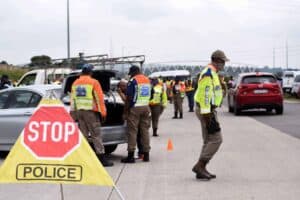JPSA's Howard Dembovsky said the release sends a rather 'unfortunate' message with respect to road safety.

The Justice Project South Africa (JPSA) on Thursday slammed the release on parole of Hip Hop star “Jub Jub”, whose real name is Molemo Maarohanye, and his co-accused Themba Tshabalala.
ALSO READ: Jub Jub and co-accused released on parole
Maarohanye and Tshabalala were both released on parole on Thursday after serving four years, one month and one day in prison for culpable homicide in 2012.
The pair were initially sentenced to life for crashing into a group of children while racing their Mini Coopers in the street in Soweto on 8 March 2010.
Four boys – Prince Mohube, Mlungisi Cwayi, Andile Mthombeni, and Phomello Masemola – were killed. Frank Mlambo and Fumani Mushwana were left permanently brain damaged.
Maarohanye and Tshabalala were convicted of four counts of murder and two counts of attempted murder in 2012.
However, on appeal in 2014 the convictions were converted to culpable homicide and their sentences reduced from 25 years to eight years imprisonment each.
On Thursday the pair walked out of jail, much to the chagrin of the JPSA.
In a statement, JPSA chairperson Howard Dembovsky said the release sends a rather “unfortunate” message with respect to road safety.
Dembovsky said even though two of the three families of the victims reportedly said they would accept Maarohanye’s and Tshabalala’s parole if they apologised to them first, it must never be forgotten that enormous human suffering was inflicted by the two parolees.
He said this matter highlighted the extreme danger posed by driving under the influence (DUI) of alcohol and drugs.
“The fact that these men were originally convicted of murder, which conviction was subsequently overturned, must also be taken into account since the combined events surrounding this matter weigh into people’s perceptions of justice and in particular, the ‘deterrent factor’ of sentencing,” Dembovsky said.
Dembovsky added that the JPSA, along with organisations such as South Africans Against Drunk Driving, was of the view that a far greater emphasis and higher degrees of professionalism needed to be placed in the proactive detection and prosecution of intoxicated driving.
“It is a sad fact that relatively few DUI arrests result in convictions and this is largely due to prolonged and unjustifiable delays in evidential blood alcohol test results from the Department of Health,” Dembovsky said.
ALSO READ: Jub Jub to release an ‘I’m sorry’ song
“Rightly so, courts cannot and will not convict accused persons in the absence of reliable and scientifically provable evidence in ‘technical offences’ where specific ‘tolerances’ are prescribed.”
Dembovsky said the proposed reintroduction of evidential breath alcohol testing (EBAT) in prosecution of driving under the influence of alcohol mooted by Western Cape authorities, after a moratorium thereon since 2012, cannot come soon enough.
“While lengthy terms of imprisonment after killing and/or maiming may serve as a ‘deterrent’ to a few people, for as long as intoxicated drivers think that the chances of it happening to them, and/or of being caught and convicted before it does is low, the scourge of intoxicated driving will continue,” Dembovsky warned.
For more news your way, follow The Citizen on Facebook and Twitter.






